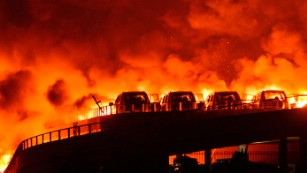High levels of dangerous chemicals remain at the site of last week’s deadly chemical warehouse blasts in the northern Chinese city of Tianjin — hundreds of times higher than is safe at one spot — officials said Thursday, signaling that a cleanup has a significant way to go.
Water tests show high levels of sodium cyanide, an extremely toxic chemical that can kill humans rapidly, at eight locations at the blast site, Ministry of Environmental Protection official Tian Weiyong said.
The sodium cyanide level at one spot was 356 times higher than a safety limit, Tian said.
The polluted water is being contained in a “warning zone” around the blast site, officials said. City authorities have said that air and water quality outside the blast zone has been in the normal range, but angry citizens with homes nearby have expressed concerns about the long-term environmental and health consequences of the blasts.

“Cyanide pollution is severe inside the warning zone. Outside the zone overall, the amount of cyanide detected is at normal range,” Tian said.
However, a large number of dead fish found in a river near the blast site are stoking fears that contamination has spread. Deng Xiaowen, a Tianjin environmental monitoring official, said Thursday that many factors could have caused their death and a team was verifying the cause.
The August 12 blasts occurred at a warehouse, where more than 700 tons of highly toxic substances, mainly sodium cyanide, were being stored, state media have reported.
At least 114 people were killed as a result of the explosions, and 69 people are reported missing.
The explosions affected a huge swath of the city: 17,000 homes damaged, more than 170 companies affected and 3,000 cars destroyed.
Thousands of people whose homes were damaged by the explosions’ shock waves took shelter in nearby schools and apartment compounds in the days afterward.
Officials said cleanup crews have been making progress. As of Thursday, about 20% of the sodium cyanide had been removed from the blast site, Tianjin Vice Mayor He Shushan said, according to the People’s Daily, the ruling Communist Party’s official newspaper.
Tianjin environmental monitoring official Deng Xiaowen said that all of the polluted water is “blocked in the blast area.” There was no information about what immediate dangers the cyanide at the blast site could pose.
“It won’t be discharged before reaching to the normal quality standard,” he said Thursday.
U.N. expert criticizes China’s handling of Tianjin blasts
A top U.N. expert has criticized China over its handling of the Tianjin blasts, saying a better flow of information might have lessened or even prevented the disaster.
Baskut Tuncak, the U.N.’s special rapporteur on human rights and hazardous substances and wastes, called on the Chinese government to ensure complete transparency in the investigation of the disaster.
“The lack of information when needed — information that could have mitigated or perhaps even prevented this disaster — is truly tragic,” he said in a statement Wednesday.
“Moreover, the reported restrictions on public access to health and safety information and freedom of the press in the aftermath are deeply disturbing, particularly to the extent it risks increasing the number of victims of this disaster.”
The blunt rebuke comes after China’s State Council formed an investigative committee to “give a responsible answer” about the cause of the disaster and promised “serious punishment” for those responsible.
On Wednesday, Tianjin Mayor Huang Xingguo addressed the media for the first time, saying he bore “an unshirkable responsibility” for the blasts.
Possible safety violations
News reports have suggested that safety violations and corporate negligence may have played a role in the disaster.
